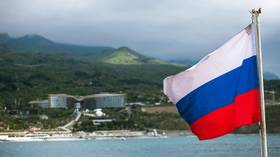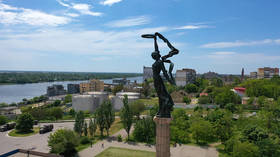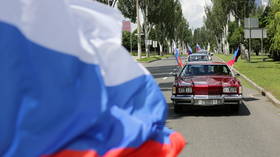Ivan Timofeev: It’s about more than Ukraine, Russia is staging a rebellion against the West and its liberal world order

The military conflict in Ukraine today is the central flashpoint in relations between Russia and the West, and largely sets the tone for security policy in the Euro-Atlantic region. It also has many global implications. In the ideological sphere, it is increasingly presented as a struggle between the liberal world order and the “mutiny of the malcontents.” It is Russia that today has assumed the role of the vanguard of such a rebellion, openly challenging its Western rivals.
The use of the concept of a revolt here is not accidental. The West is promoting a liberal world order based on clear ideological assertions. These include the market economy; the globalization of standards, trade and technologies; liberal democracy as the only acceptable political form for the organization of states; an open society and a diversity of cultures and ways of life; and its interpretation of human rights.
In practice, the implementation of these principles varies from country to country and changes over time. However, the diversity of practice has little effect on the integrity of the ideology. Unlike the West, Russia does not offer an alternative ideological menu. So, Moscow, today, differs from the Soviet Union, which at one time adopted another modernist creed –socialism– and actively promoted it as a global alternative.
At the same time, both liberalism and socialism are Western doctrines. The pair are based on the ideas of progress, rationality and emancipation. There are more similarities between them than you might think. Socialists offer a different view of private property, pointing to the excesses of the uncontrolled market. Already in the twentieth century, however, there was a convergence of liberal and socialist ideas in the form of a combination of state regulation and the market. With regards to their political ideation, democracy and the power of the people are no less important for socialism than for liberalism. Traces of the idea of globalisation could be found in the concept of international worker solidarity. Liberation from prejudices and the rationalisation of all spheres of life are expressed as clearly in socialism as in liberalism.
The problem with the Soviet Union was that the implementation of socialist ideas eventually turned into an imitation. The principles of democracy remained on paper, but in reality they were crushed by an authoritarian (and at certain stages totalitarian) state. In the initial rationalisation of the economy and industrialisation, the USSR achieved amazing success, but later it ran into stagnation, unable to adapt its system to rapidly changing world realities. The weakness of the economy, with its raw-material bias, was identified back in the Brezhnev era. Emancipation, at first, proved unprecedented, but was also ultimately hobbled by the increasingly rigid social structure of the Soviet state. At the end of the Cold War, the picture was completed by double standards and a cynical attitude towards the ideology of Soviet society itself and its elite.
Despite the collapse of the Soviet project, the policy of the USSR could hardly be called a rebellion. Throughout its history, the state still offered a systemic alternative. Relations with the bourgeois environment could be called an attempt at revolution, and then rivalry and competition, but not a revolt. Soviet policy had a positive agenda, offering a holistic picture of the world.
The current “Russian rebellion” is based on dissatisfaction with the established status quo of the liberal world order, or rather, its individual consequences for Russia.
There are reasons for such a posture. Scepticism about democracy has been fuelled by the practical possibilities for foreign states to ‘hack’ democratic institutions. Colour revolutions in the post-Soviet space have only strengthened this attitude.
The flip-side of democracy is the possibility of interference in democratic institutions from the outside in order to ‘correct’ the political course. The US, not without reason, was considered a key ‘hacker’ of national sovereignty through the manipulation of democratic institutions abroad. All the more ironic was the indignation of Washington itself, after Russia itself allegedly also tried to interfere in American democracy.
Russia’s greatest annoyance was its secondary role in the unipolar world order, the disregard for its interests, and that system’s increasingly clear refusal to perceive it as an equal partner. Interestingly, economic factors were secondary for the ‘Russian rebellion.’
In theory, Russia can be considered dissatisfied with its peripheral status in the global economy and its role as a raw materials appendage. In practice, Russia has become very deeply integrated into the international division of labour. However, compared to the stories about democracy, sovereignty and foreign policy, Russia’s concern with its place in the world economy was articulated in a very weak way. Liberal emancipation can hardly be considered the main political problem for Moscow. In some aspects, the Russian narrative has distanced itself from the Western mainstream. This concerns such topics as multiculturalism and sexual minorities; although in the West itself, perceptions of these remains extremely heterogeneous. At the same time, in terms of lifestyle, Russia is a European and Western country, so culture, like the economy, can hardly be considered a key source of the problem.
Given the concentration of Russian discontent in the political sphere, it is hardly surprising that it was the Ukrainian issue that became the trigger for the“Russian rebellion.” The Maidans and the change of power were seen by Moscow as a cynical hack into the country's political system, and a harbinger of a potential hack eventually targeting Russia itself.
In addition, at the doctrinal level, Ukraine was increasingly positioned as a fundamentally different project, drifting further and further towards Western values. From the point of view of foreign policy, it was with regards to the Ukrainian issue that Russian interests in the field of security were discriminated against in the most acute form. Economic issues here also acquired political overtones: Moscow could put pressure on Kyiv with gas prices and threats to diversify its transit, but it was clearly losing to the European Union and other Western players in the very model of economic integration. It is not surprising that all those contradictions that had accumulated after the Cold War made themselves known in Ukraine.
Realising that the game was being played according to fundamentally unfavourable and discriminatory rules from the Russian point of view, Moscow not only slammed the table with its fist and brushed the pieces off the board, it also decided, figuratively speaking, to hit its opponents hard on the head with this board. Rivalry ‘according to the rules’ turned into a fight, the field of which is Ukraine. At the same time, on the part of the West itself, there is a degree of irritation, discontent and rejection of Russia, proportional to its own discontent or even surpassing it.
The West is frustrated by the very fact of a decisive rebellion, its senselessness in terms of the balance of benefits and losses, and the ruthlessness of Russian pressure. Hence the obvious non-selectivity and emotionality of retaliatory strikes, a bizarre mixture of sanctions bombings, plans to confiscate Russian property, defeat the 'oligarchs’ (the most pro-Western wing of Russian high society) and equally senseless bullying of the Russian cultural, sports and intellectual elite, and of the citizenry as a whole. Only the threat of a direct military confrontation with Moscow keeps them from using military force.
The West has every reason to fear the "Russian rebellion." Worries about the liberal world order arose long before 2022 and even before 2014. Compared to Russia, China poses a far greater danger. If the ‘Russian rebellion’ is successful, it will become clear that China’s ambitions will be even more difficult to contain. Moreover, unlike Russia, China can offer an alternative economic model, and its own view of democracy, as well as a different ethic of international relations.
The success of the 'Russian rebellion’ may become a prologue to much more systemic challenges. Therefore, the pacification of Russia for the West has become a task that clearly goes beyond the boundaries of the post-Soviet and even the Euro-Atlantic space.
Meanwhile, in the actions of Moscow, there have been signs of progress that are unpleasant for the West. Yes, the Western blockade will increase the lag and backwardness of the economy. Yes, military operations are costly. Yes, they can cause unpredictable social reactions and even present a challenge to political stability. None of these challenges, however, are capable of knocking Russia off its political course from now on. Moscow is slowly developing an offensive and seems to be determined to integrate the occupied Ukrainian territories into its political, informational and economic space.
Ukraine faces not only colossal economic and human losses, but also the threat of losing territory. Large-scale Western aid is having an effect, making it difficult for Russia to act. Apparently, however, it is not able to stop Moscow: infusions of military equipment are simply ground up by military operations. The longer the conflict drags on, the more territory Ukraine could lose. This presents the West with the unpleasant realisation that it is necessary to reach at least a temporary agreement with Russia. It will be preceded by an attempt to reverse the military situation. However, if it fails, Ukraine will simply not be able to stop the further loss of its statehood.
In other words, the 'Russian rebellion’ has a chance to end in success in the sense that it may end in a fundamental reformatting of a large post-Soviet state that has recently been hostile to Russia. It will show the readiness and ability on the part of Russia to back up its claims with the most radical actions.
Will the success of the rebellion mean its victory? This will depend on two factors. The first is the international political implications. A military success in Ukraine could set off a chain of global consequences leading to the decline of the West. However, such a scenario is far from predetermined. The West's margin of safety is high, despite its apparent vulnerability. The readiness of other non-Western players to give up the benefits of globalisation for the sake of abstract and vague political guidelines like a multipolar world is not completely obvious.
It is likely that the West will have to endure the new status quo in Ukraine, but this does not mean the defeat of its model. Russia does not systematically challenge this system and does not have a complete picture of how to change it. In Moscow, perhaps, they believe that the structure has become obsolete and expect it to collapse by itself, but this conclusion is far from certain.
The second factor is the consequences for Russia itself. By avoiding promoting a global alternative to the liberal order, Russia will at least have to decide on a programme for its own development. So far, its contours are also built mainly around the denial of the West and its models in certain areas. Nevertheless, the vast majority of other non-Western countries, while defending their sovereignty, are actively developing and cultivating Western practices that benefit them. These include the organisation of industry, developments in the field of science and education, and participation in the international division of labour.
The rejection of such practices, just because they are conditionally Western, as well as the 'cosplay’ of Soviet attitudes created amid different historical conditions and left in the distant past, can only increase the difficulties that Russia is currently facing. The preservation and development of a market economy as well as an open and mobile society remain among the most important tasks.
The statements, views and opinions expressed in this column are solely those of the author and do not necessarily represent those of RT.















